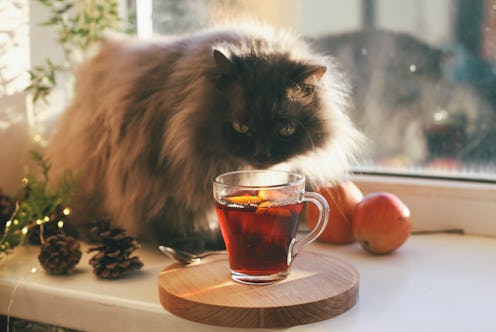Health
3 Ways Mulled Wine Is Good For You, & 1 Way It’s Not
Here’s how your body responds to the festive classic.

The holidays are the time for present-wrapping, yelling your favorite Mariah Carey songs at the top of your lungs, and the sweet scent of spiced hot drinks spilling through your house. But how does your body react to a warm, spicy bev? The health benefits of mulled wine may come second to its taste when you're holding a steaming cup to your nose, but experts tell Bustle that it has a few nutritional tricks up its sleeve.
"Warming mulled wine combines red wine and seasonal flavors and spices like oranges, cinnamon, nutmeg, cloves and allspice," Ginger Hultin R.D.N., a dietitian nutritionist and spokesperson for the American Academy of Dietetics and Nutrition, tells Bustle. Alcoholic drinks spiked with spices, like mulled ales or the amazingly named Smoking Bishop, became popular in the 19th century as a 'healthy' drink to stave off colds and the blues, says food historian Annie Gray Ph.D. And those ingredients, combined in a steaming mug, combine into a festive classic.
Whether you nab it off a supermarket shelf or mull your own wine or apple juice over the stove with a muslin bag of cinnamon and spices, here are the potential health benefits of mulled wine, and the caveats.
The Spices Can Pack A Nutritional Kick
"All those winter spices contain anti-inflammatory benefits, with their many antioxidants and special compounds," Hultin says. The classic combination of mulling spices includes allspice berries, whole cloves, ginger, nutmeg, and a cinnamon stick or two.
In high enough quantities, these spices can help protect your cells from oxidative stress, a process that can cause inflammation and contribute to chronic illnesses. An overview of herbs and spices published in Antioxidants in 2017 found that cloves, ginger, allspice, nutmeg and cinnamon all contain powerful compounds and flavonoids that help reduce inflammation. It also notes that the active ingredients in ginger and cinnamon have been linked to better cardiovascular health.
It's worth remembering that you might not actually ingest many of the active ingredients in each spice, once they've been dissolved in red wine and heated, not to mention the small portion would only have a minimal impact. Still, a little spice in your life won't hurt.
Citrus Gives You A Vitamin Boost
Oranges are a classic mulled wine ingredient, and a cold season mainstay for a reason. "Citrus contains the antioxidant vitamin C, potassium and B-vitamins," Hultin says. Vitamin C helps the body control inflammation, and can also help with wound healing and collagen production, according to Harvard Health. A 2015 study published in Chemistry Central Journal called citrus fruits a 'treasure trove' of potential helpful compounds for human health, including lowering the risk of cardiovascular disease.
Dr. Seema Sarin M.D., head of lifestyle medicine at EHE Health, tells Bustle that a lot of the health benefits of citrus, including its dose of fiber, occur when you eat them whole. So perhaps make sure you fish out that delicious soaked orange slice and eat it, too.
There's Evidence Red Wine Contains Helpful Compounds
"Research on the potential health benefits of wine show that, when consumed in low quantities, red wine may help raise good HDL cholesterol and slightly thin the blood by reducing platelet aggregation, both of which can support heart health," Hultin says. The studies of red wine, she says, often range from half a glass to one glass per day. One 2019 study published in Molecules found that "moderate" red wine consumption can be healthy, since it contains antioxidant properties and reduces cardiovascular stress.
All Alcohol Should Be Drunk In Moderation
But there's a caveat to red wine's helpfulness. "The latest dietary guidelines make it clear that no one should begin drinking alcohol or drink more often on the basis of potential health benefits," Dr. Sarin says. A 26-year study published in The Lancet in 2018 found that no level of alcohol consumption should be considered safe. "For many people, the possible benefits don't outweigh the risks and avoiding alcohol is the best course," she says.
Dr. Sarin suggests drinking in moderation over the holiday season. It's also possible to find awesome non-alcoholic mulled alternatives, like apple juice, fancy non-alcoholic ciders, or punches made of tasty winter fruits.Heat them up, add your mulling spices, and enjoy the best smell of winter.
Experts:
Annie Gray Ph.D.
Ginger Hultin RDN
Dr. Seema Sarin M.D.
Studies cited:
Castaldo, L., Narváez, A., Izzo, L., Graziani, G., Gaspari, A., Minno, G. D., & Ritieni, A. (2019). Red Wine Consumption and Cardiovascular Health. Molecules (Basel, Switzerland), 24(19), 3626. https://doi.org/10.3390/molecules24193626
GBD 2016 Alcohol Collaborators (2018). Alcohol use and burden for 195 countries and territories, 1990-2016: a systematic analysis for the Global Burden of Disease Study 2016. Lancet (London, England), 392(10152), 1015–1035. https://doi.org/10.1016/S0140-6736(18)31310-2
Lippi, G., Franchini, M., Favaloro, E. J., & Targher, G. (2010). Moderate red wine consumption and cardiovascular disease risk: beyond the "French paradox". Seminars in thrombosis and hemostasis, 36(1), 59–70. https://doi.org/10.1055/s-0030-1248725
Lv, X., Zhao, S., Ning, Z., Zeng, H., Shu, Y., Tao, O., Xiao, C., Lu, C., & Liu, Y. (2015). Citrus fruits as a treasure trove of active natural metabolites that potentially provide benefits for human health. Chemistry Central journal, 9, 68. https://doi.org/10.1186/s13065-015-0145-9
Yamada, T., Hayasaka, S., Shibata, Y., Ojima, T., Saegusa, T., Gotoh, T., Ishikawa, S., Nakamura, Y., Kayaba, K., & Jichi Medical School Cohort Study Group (2011). Frequency of citrus fruit intake is associated with the incidence of cardiovascular disease: the Jichi Medical School cohort study. Journal of epidemiology, 21(3), 169–175. https://doi.org/10.2188/jea.je20100084
Yashin, A., Yashin, Y., Xia, X., & Nemzer, B. (2017). Antioxidant Activity of Spices and Their Impact on Human Health: A Review. Antioxidants (Basel, Switzerland), 6(3), 70. https://doi.org/10.3390/antiox6030070
This article was originally published on